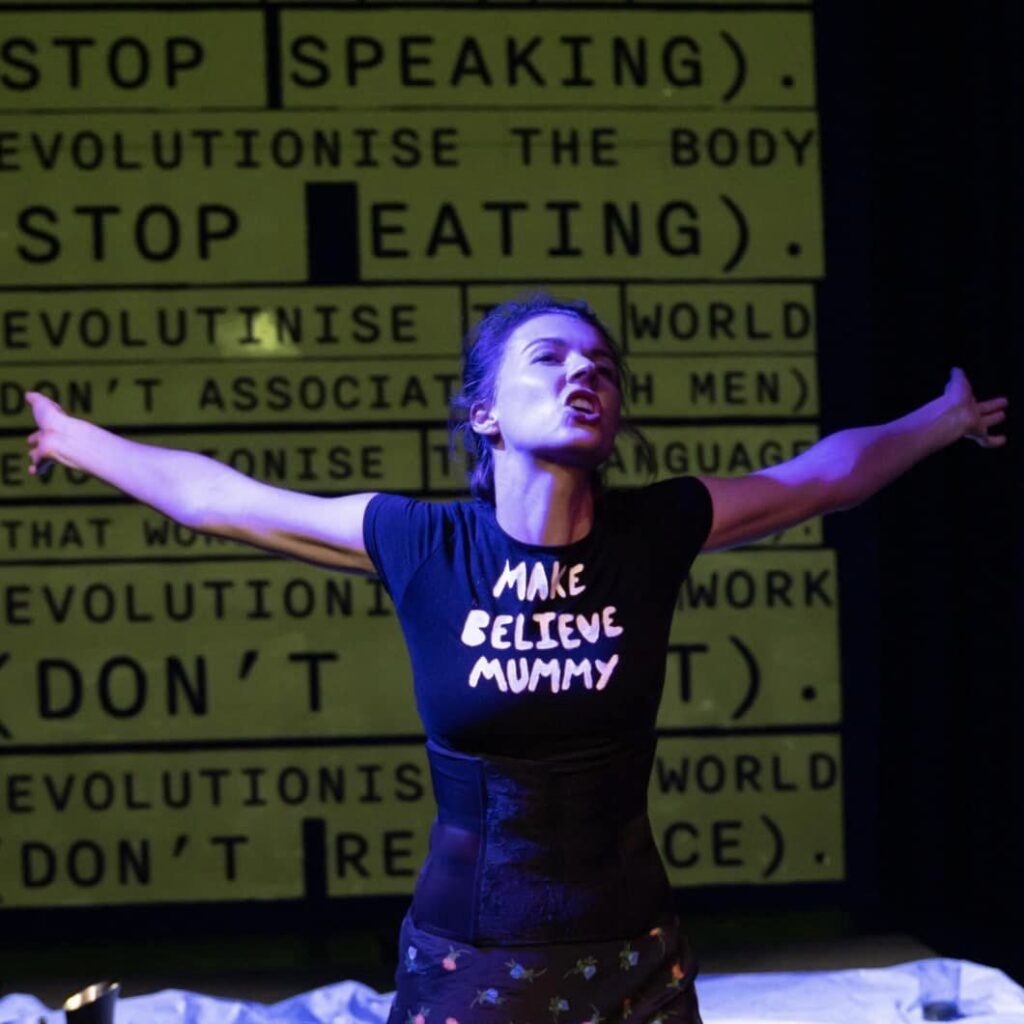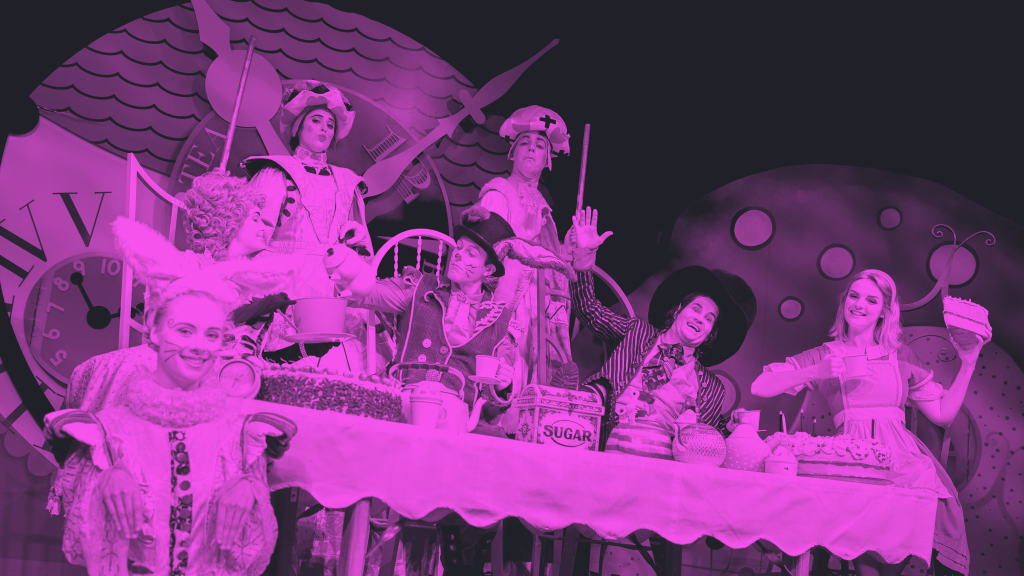
‘Revolt. She Said. Revolt Again.’ // Vena Cava Productions
‘Revolt. She Said. Revolt Again.’ was uncomfortable.
‘Revolt. She Said. Revolt Again’ is Alice Birch’s blunt and unafraid statement of what is wrong with the world. It is a manifesto of bashful, impolite femininity that points a finger at the twisted manner in which society uses language to control and oppress women. Staged at Metro Arts, Vena Cava Productions’ rendition of the piece leans into the emphasis of language with bold aesthetic choices throughout.
Upon entering the space, audiences are greeted by the cast in their dressing gowns upon a purple-washed stage, seemingly warming up. As the script demands, it is clear from the start that there has been an effort to blur the lines between reality and the life of the play. Centre stage, a square platform sits lined by red LED strips creating an almost floating illusion. Behind the platform, a screen depicts skulls growing out of vines with the show’s title in bold. Even in just this preshow state, an understanding of the darkness that is to come can be felt.
Vision design by Lani Dwyer is a driving force in drawing an emphasis on the language used and the power it holds throughout the piece. As character’s speak, their words appear on the screen behind them, almost acting as subtitles. The words appear and disappear abruptly as characters challenge the meaning of them. A particularly effective moment occurs when a character yearns for ownership over her own body and the words begin to frame her outline. Even despite her efforts to free herself from societal expectations, this design choice highlights how language constraints and shapes how women are perceived as sexual beings.
This moment is further emphasised with the production design and costume choices by Charli Lobely-Evans and Tegan Kelsey. Framed by words and wearing a dress printed with the words ‘Loud Mouth Slut’, the performer (Keeley Hay) strips the dress and the words off her; another attempt at freedom. Similar costuming is used throughout the performance with each character donning labels such as ‘Stone Cold Bitch’, ‘Little Miss Independent’ and more. This use of switching labels and costuming also played part in assisting audiences in keeping up with the ever changing characters due to the episodic nature of the piece.
This episodic nature and fast pace also meant transitions between scenes had to be fast and engaging. This was achieved well with lighting design and sound design by Timothy James and Caleb Bartlett, respectively. A bass-heavy sound track paired with blue and red lights drove action forward in a simple, yet effective manner. Moments of white noise throughout assisted in creating tension and an effective use of spotlights is a stand out moment as various characters insist ‘Yes I’m a feminist!’ after being literally put on the spot.
The cast has the arduous task of embodying multiple characters and without a second of time off stage, they should be commended for their efforts. With so many varying storylines, the most effective moments occurred when the characters felt truly connected to each other.
Madeleine Wilson and Mia Chisholm demonstrated this connection well in their scene that saw Chisholm’s character begging Wilson’s character for Monday’s off work. The two actors were completely engaging, listening to each other with clear intent. The scene flowed effortlessly, igniting laughter within the audience whilst still hitting the hard and honest themes of misogyny in capitalistic environments.
A similar moment of genuine connection occurred between Karrine Kanaan and Keeley Hay in Act Three of the piece. This Act sees the performance explode into chaos with characters talking over each other, yelling, screaming and crying. However, promptly after the chaos, there is a direct address to audience performed by Hay and Kanaan. After an extended moment of sensory overload, this address feels grounded and driven with both actors connecting not only to each other but to the audience as well. The sense of drive in this moment is also assisted with Bartlett’s sound design as both actors let the rock music heighten the stakes as they beg for change.
Rounding out the cast is Gillian Thomas, Jamie Dickman and Joel Dow. Thomas’ performance throughout is brave with multiple scenes requiring intense moments of intimacy from her. Dickman and Dow bring masculine energy to the cast, with moments of synchronised physicality emphasising their character’s assumed power and status over their female counterparts.
With direction by Hannah Barr, Revolt. She Said. Revolt Again. was abrupt and graphic. A difficult script to stage, this production was courageous in its attempt to spread Birch’s message. Dipping into the world of meta theatrics, its strongest moments occurred when characters felt connected to each other and the language. A clearer distinction between actor and character would’ve allowed for these moments of connection to achieve more consistency as well as allowed the piece to delve deeper into its meta-theatrical state. This performance will make the audience shift in their seats; it is clearly not meant to be comfortable. It is a spit in the face of sexism and misogyny that will leave audiences acutely aware of the change that needs to happen in the world.
‘Revolt. She Said. Revolt Again.’ performed until Saturday, 22 April 2022 at Metro Arts. For more information visit their website.






